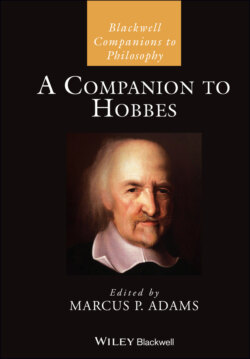Читать книгу A Companion to Hobbes - Группа авторов - Страница 33
2.1.1 Tertullian
ОглавлениеPerhaps the most direct Stoical impact on Hobbes was the second/third century Church Father Tertullian. A Roman Christian-Stoic, Tertullian insisted, like Hobbes, on the philosophical and Scriptural truth of materialism about God and finite souls. He endorsed the “probable opinion of the Stoics,” which he explicitly adapted from Zeno, Cleanthes, and Chrysippus, that the soul is a corporeal “breath” or “spirit” that permeates the body. This is Hobbes’s understanding of Scripture as well in Leviathan XLIV (2012, 612, 974; 1651, 303, 481). Like modern materialists, Tertullian argues that dualism makes soul–body interaction problematic since “there is nothing in common between things corporeal and things incorporeal.”3 Hobbes repeatedly invokes the authority of Tertullian in works that develop and defend the corporeal God doctrine (to be discussed later) in the 1660s. The first instance is the 1662 Considerations Upon the Reputation of Thomas Hobbes, a late volley in the long battle with Oxford mathematician John Wallis. Against the charge that his materialism is “atheism by consequence,” Hobbes quotes verbatim from Tertullian’s De carne Christi: “whatever is anything is a body of its kind. Nothing is incorporeal but that which has no being” (EW IV.429; Tertullian, De carne Christi xi; 1885, 531). Hobbes cites the same passage in two 1660’s works that announce the corporeal God doctrine – the Latin Leviathan and the Answer to Bramhall – as well as in the 1680 Historical Narration Concerning Heresy (2012, 1228; OL III.561; EW IV.307, 383; EW IV.398). Although De carne Christi is thoroughly materialist, it does not pronounce directly on the corporeity of God. However, in the Latin Leviathan’s affirmation of that doctrine, Hobbes cites an additional Tertullian text, against the heretic Praxeas: “every substance is a body of its own kind” (2012, 1228; OL III.561). Hobbes slightly misquotes Tertullian, but he clearly has in mind the following passage, which explicitly asserts the corporeity of God: “Who will deny that God is body (deum corpus esse) although God is a spirit?” (Ad Praxeas vii, 1885, 602).4 There are other texts Hobbes might have encountered in his careful reading of Tertullian that reflect even more closely his own formulation of corporeal theism.5
